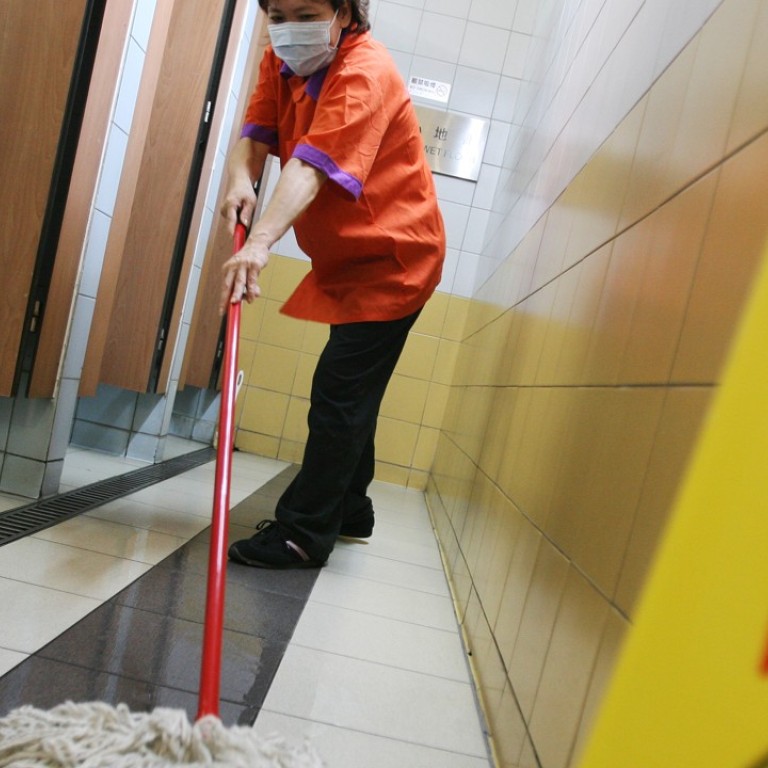
Letters to the Editor, May 3, 2017
Annual hike in minimum wage essential
On Monday, the statutory minimum wage in Hong Kong was raised by HK$2 to HK$34.50 an hour. It will be at this level for two years. However, I agree with labour union leaders that there should be an annual revision.
They argue that only reviewing it every two years means the hourly rate would fail to keep pace with rising prices in the city. The hardest-hit sections of the community are elderly workers with few skills who struggle to get decent jobs.
The sum earned in an hour can be spent on a coffee at Starbucks or a single MTR trip from Hung Hom to Lo Wu. This state of affairs is not going to change, the cost of living will just keep on increasing and we will continue to see high rates of intergenerational poverty. Families on low incomes will not be able to improve their situation.
Moreover, the wealth gap is already a serious problem in Hong Kong. As prices rise, the poor become even worse off than before. Hopefully, if there was an annual revision of the minimum wage, we would see a narrowing of that wealth gap and find fewer people caught in the poverty trap.
Christy Chung Chi-ching, Yau Yat Chuen
Corporations should adopt green initiative
The MTR, various big corporations, the Link Reit and property developers should all promptly follow the government’s example, and take steps to migrate from traditional lighting to LED systems in the vast areas under their control.
The Environmental Protection Department should push for this change. I would suggest that a system be established where the biggest consumers of electricity in Hong Kong regularly report the amount of electricity the areas and properties within their control have been consuming.
That way, the public will also be aware that a concerted effort is being made to reduce our total carbon footprint.
It would also be a welcome move if the corporations and property developers passed on the savings thus made to their tenants and consumers.
Venkitaraman Krishnan, Cha Kwo Ling
Urgent action needed to clean up capital’s air
I agree with correspondents who have pointed out that the air pollution problem in Beijing is getting serious.
The central government must do more, by limiting emissions from the worst-polluting vehicles and factories. Its focus should not just be on economic growth, but also on protecting the health of the residents of the national capital.
The country’s largest manufacturers should cooperate with any initiatives to cut emissions.
If efforts are made to raise citizens’ levels of awareness, then hopefully more of them will choose public transport rather than use private cars.
Kitty Lui Sze-ki, Tseung Kwan O
Tuen Mun River is in a filthy state
Hong Kong proudly proclaims itself to be a world-class city, but sometimes I see things which undermine that reputation.
Last month, I visited an old friend in Tuen Mun. The new town has an outstanding park.
However, just across from the park is Tuen Mun River and when I visited I saw a lot of rubbish floating in it, and found the water seriously polluted.
I hope the government will act to rectify this sad state of affairs. It must enforce anti-littering and anti-pollution laws.
Signs should be put up along the river warning of the penalties for littering. Anyone tempted to dump rubbish into the river must be made to realise that they face heavy fines and possible imprisonment if they are caught.
The police need to monitor the river area on a daily basis and arrest litter louts.
If action is not taken the pollution problem will only get worse.
K. M. Nasir, Mid-Levels
Cram schools can often make pressure worse
An increasing number of Hong Kong students attend what are known as cram schools, because of the local education system.
In the past, most of the youngsters who went to such schools did so because of poor academic results. However, these colleges are less expensive than they used to be and have become more popular.
Even if they are getting good grades in class, many students will still sign up, because they want to do even better in the Diploma of Secondary Education (DSE) exam.
Doing well isn’t good enough any longer, they feel they have to get the highest possible mark.
This leads to an even more competitive culture in our schools and increases the pressure on teenagers. They work even harder and even later at night. In doing so, they forget the main purpose of studying, which should be a form of self-improvement.
There is nothing wrong with an element of competition, but in local schools it has gone too far and young people are losing sight of core values.
Mary Ko, Tseung Kwan O
Schools should aim for more PE lessons
Even if youngsters are keen to pursue a sport, council facilities are often fully booked.
In addition, there is often social pressure from family and schools, with teenagers encouraged to concentrate instead on their studies.
I am a secondary school student and find I have very little spare time for sport. When I get home from school, I have to concentrate on my homework. It often leaves me too tired for any kind of exercise.
Schools should provide more physical education lessons and encourage students to try different kinds of sport.
Kevin Chan, Po Lam

